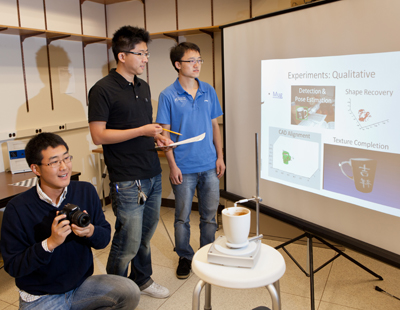Computer Vision Course is part of a groundbreaking online initiative
Computer Vision seeks to imitate humans’ ability to recognize objects, navigate scenes, reconstruct layouts, and understand the geometric space and semantic meaning.

 Enlarge
Enlarge
The University of Michigan is venturing into the brave new world of free online courses through the education company called Coursera, founded in 2011 by two faculty from Stanford University. Among the courses to be offered is one in Computer Vision, taught by Prof. Silvio Savarese and Prof. Fei Fei Li of Stanford.
“This is the first time I will teach an online course and I am very excited about this opportunity,” stated Prof. Savarese. “I look forward to the chance to reach out to thousands of students all over the world!”
The course is called, Computer Vision: From 3D Reconstruction to Visual Recognition, and focuses on advanced research in computer vision. Watch it on YouTube here. This excerpt from the course introduction provides a general overview of the topic:
“Computer Vision, a modern discipline of artificial intelligence, seeks to imitate such abilities of humans to recognize objects, navigate scenes, reconstruct layouts, and understand the geometric space and semantic meaning of the visual world. These abilities are critical in many applications including personal robotics, autonomous driving and exploration as well as photo organization, image or video retrieval and human-computer interaction.
When a 3-dimensional world is projected onto a 2-dimensional image, such as the human retina or a photograph, reconstructing back the layout and contents of the real-world becomes an ill-posed problem that is extremely difficult to solve. Humans possess the remarkable ability to navigate and understand the visual world by solving the inversion problem going from 2D to 3D. We emphasize two key issues in modeling vision: space and meaning.”

 Enlarge
Enlarge
Prof. Savarese directs the Computer Vision Lab. His research focuses on the analysis and modeling of visual scenes from static images as well as video sequences. He received a TWR Automotive Endowed Research Award in 2012, an NSF Career Award in 2011 and Google Research Award in 2010. He teaches undergraduate and graduate-level courses in computer vision, including a new course called “Advanced Topics in Mobile Computer Vision.” He also recently published the book Representations and Techniques for 3D Object Recognition and Scene Interpretation, Synthesis lecture on Artificial Intelligence and Machine Learning, Morgan & Claypool Publishers, 2011.
Individuals taking the course will not get University credit for the course, but this seems not to matter to the 50,000 individuals who have signed up to take a U-M course taught by Prof. Scott Page, also offered through Coursera.
The prospect of reviewing thousands of homework assignments seems daunting at best – but Prof. Savarese and Prof. Li are investigating computer-based methods to evaluate students’ code so that individual work can be uniquely evaluated.
The course will be offered as early as July 23, 2012.
Additional Information
Computer Vision: From 3D Reconstruction to Visual Recognition [you may need to get a Coursera account to view the page]
The University Record – U-M among first to offer courses through groundbreaking online approach
New York Times – Online Education Venture Lures Cash Infusion and Deals With 5 Top Universities
NRP – From Silicon Valley, A New Approach To Education
 MENU
MENU 
